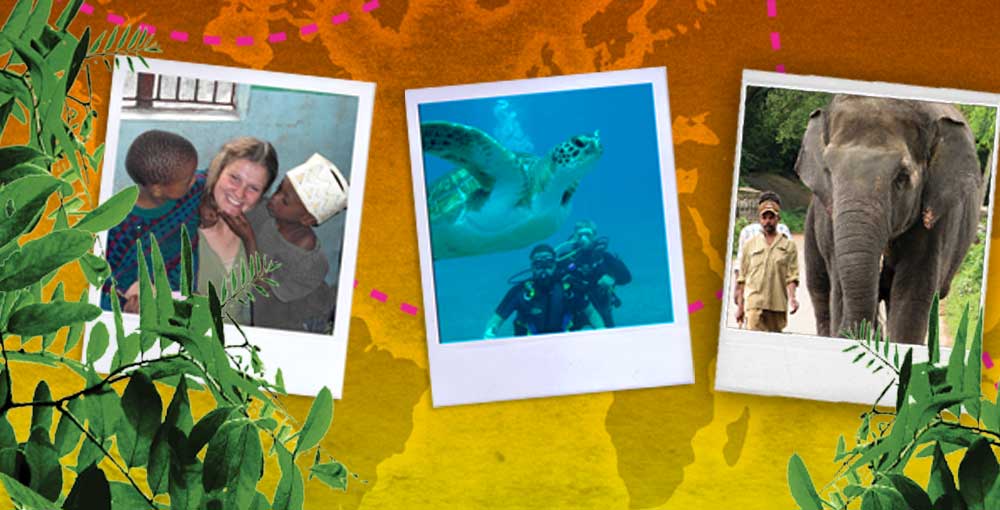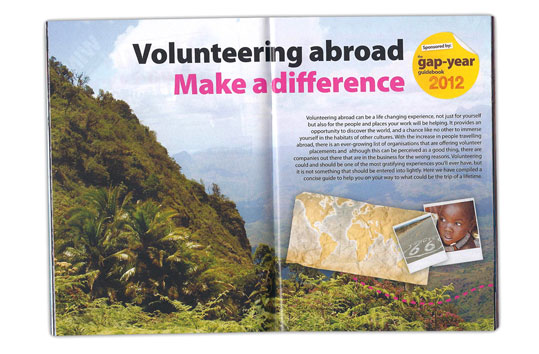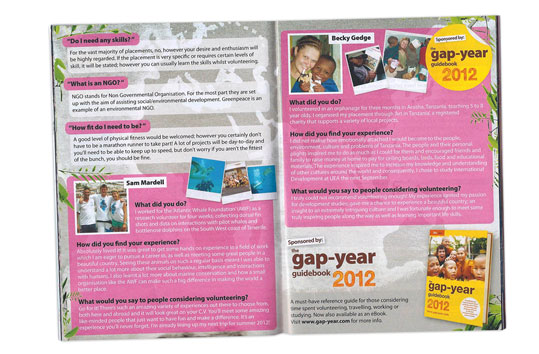Volunteering abroad can be a life changing experience, not just for yourself but also for the people and places your work will be helping. It provides an opportunity to discover the world, and a chance like no other to immerse yourself in the habitats of other cultures. With the increase in people travelling abroad, there is an ever-growing list of organisations that are offering volunteer placements and although this can be perceived as a good thing, there are companies out there that are in the business for the wrong reasons. Volunteering could and should be one of the most gratifying experiences you’ll ever have, but it is not something that should be entered into lightly. Here we have compiled a concise guide to help you on your way to what could be the trip of a lifetime.
Firstly, why do it? How do your actions help?
Placements offer much needed help for local communities all over the world, whether it’s providing healthcare for deprived areas, protecting endangered animals, or wildlife conservation. For most, this is the main reason to volunteer, knowing that your work can be significantly changing the lives of people or animals and their environments can be an incredibly rewarding experience. It also provides an opportunity like no other to really experience other cultures and places, whilst travelling the world and meeting other people.
Choose what you want to do
Most of us have always had one place in the world we have dreamt of visiting. However dreams can become realities with the opportunities that volunteering offers. Whether it’s the tranquillity of a distant island, or the mystery of hidden jungles you are after, you will be sure to find suitable opportunities all over the world.
As important, if not the most important thing is to decide what you actually want to do. This usually has a bearing on where in the world you will end up, for example if you wanted to work with elephants, you’re not going to find a placement in New Zealand! Volunteering can be roughly divided into four categories: CHILDREN/COMMUNITIES/ANIMALS/CONSERVATION.
Different choices will require different amounts of your time, for example to get the most out of teaching you would probably want to do at least a few months, though usually it is completely up to you. You will often find that placements, especially through travel agencies will mainly offer short-term packages with the option of extending your stay.
Another determining factor will be finances, as it does cost to volunteer. Obviously this will depend on the nature and length of the task you pursue. Many placements will provide two to three meals a day, accommodation and possibly other luxuries. On the other hand there are those where it is required that you provide for yourself.
Research the right company
Doing sufficient research is the most important part of your preparatory regime. If you cut corners and become complacent, you could well find out that a lack of research on your behalf will be detrimental to your experience. Each area of volunteering will have specialist organisations which are renowned for the work they do. Make sure you find the best company for what you want to do, and possibly even go as far as meeting them face to face, armed with a list of questions ready to thoroughly examine what they have to offer. After all, you are the one funding the trip, as well as providing large amounts of your time.
When you’re there
Make the most of it – plain and simple. Throw yourself at everything you can to really experience as much as possible. Of course you don’t want to go overboard, so remember to be aware of where you are and the culture which you are temporarily a part of. Act responsibly within it, for example buy locally, don’t buy souvenirs against the morals of the work you are doing (for example an ivory ornament if you are working with elephants!), and remember the simple things like turning lights off, air con, showers etc…
The FAQ’s answered!
“Where does my money go?”
This is a very valid question. Handing over hard-earned cash in return for volunteer work may seem a little strange to you, however there are plenty of costs which need addressing. Keeping safe in remote areas doesn’t come cheaply. Nor do the materials, equipment, training and personnel which accompany your stay. A significant contribution to the project is usually included in the price.
“What should I bring?”
For the most part you will be in a completely different climate which ultimately will determine what you need to take with you. The company you decide to volunteer with should, however, provide you with all these details; if they don’t then you should question their credibility!
“Do I need to know the local language?”
No, although it will be an advantage in some locations. In most cases English will be the main language.
“Do I need any skills?”
For the vast majority of placements, no, however your desire and enthusiasm will be highly regarded. If the placement is very specific or requires certain levels of skill, it will be stated; however you can usually learn the skills whilst volunteering.
“What is an NGO?”
NGO stands for Non Governmental Organisation. For the most part they are set up with the aim of assisting social/environmental development. Greenpeace is an example of an environmental NGO.
“How fit do I need to be?”
A good level of physical fitness would be welcomed; however you certainly don’t have to be a marathon runner to take part! A lot of projects will be day-to-day and you’ll need to be able to keep up to speed, but don’t worry if you aren’t the fittest of the bunch, you should be fine.
Case Study – Sam Mardell
What did you do?
I worked for the ‘Atlantic Whale Foundation’ (AWF) as a research volunteer for four weeks, collecting dorsal fin shots and data on interactions with pilot whales and bottlenose dolphins on the South West coast of Tenerife.
How did you find your experience?
Absolutely loved it! It was great to get some hands on experience in a field of work which I am eager to pursue a career in, as well as meeting some great people in a beautiful country. Seeing these animals on such a regular basis meant I was able to understand a lot more about their social behaviour, intelligence and interactions with humans. I also learnt a lot more about marine conservation and how a small organisation like the AWF can make such a big difference in making the world a better place.
What would you say to people considering volunteering?
Go for it! There’s such an amazing variety of experiences out there to choose from, both here and abroad and it will look great on your C.V. You’ll meet some amazing like-minded people that just want to have fun and make a difference. It’s an experience you’ll never forget, I’m already lining up my next trip for summer 2012!
Case Study – Becky Gedge
What did you do?
I volunteered in an orphanage for three months in Arusha, Tanzania, teaching 5 to 8 year olds. I organised my placement through ‘Art in Tanzania’, a registered charity that supports a variety of local projects.
How did you find your experience?
I did not realise how emotionally attached I would become to the people, environment, culture and problems of Tanzania. The people and their personal plights inspired me to do as much as I could for them and encouraged friends and family to raise money at home to pay for ceiling boards, beds, food and educational materials. The experience inspired me to increase my knowledge and understanding of other cultures around the world and consequently, I chose to study International Development at UEA the next September.
What would you say to people considering volunteering?
I truly could not recommend volunteering enough! My experience ignited my passion for development studies; gave me a chance to experience a beautiful country; an insight to an extremely intriguing culture; and I was fortunate enough to meet some truly inspiring people along the way as well as learning important life skills.
Sponsored by the gap-year guidebook 2012.
A must-have reference guide for those considering time spent volunteering, travelling, working or studying. Now also available as an eBook.
Visit www.gap-year.com for more info.









